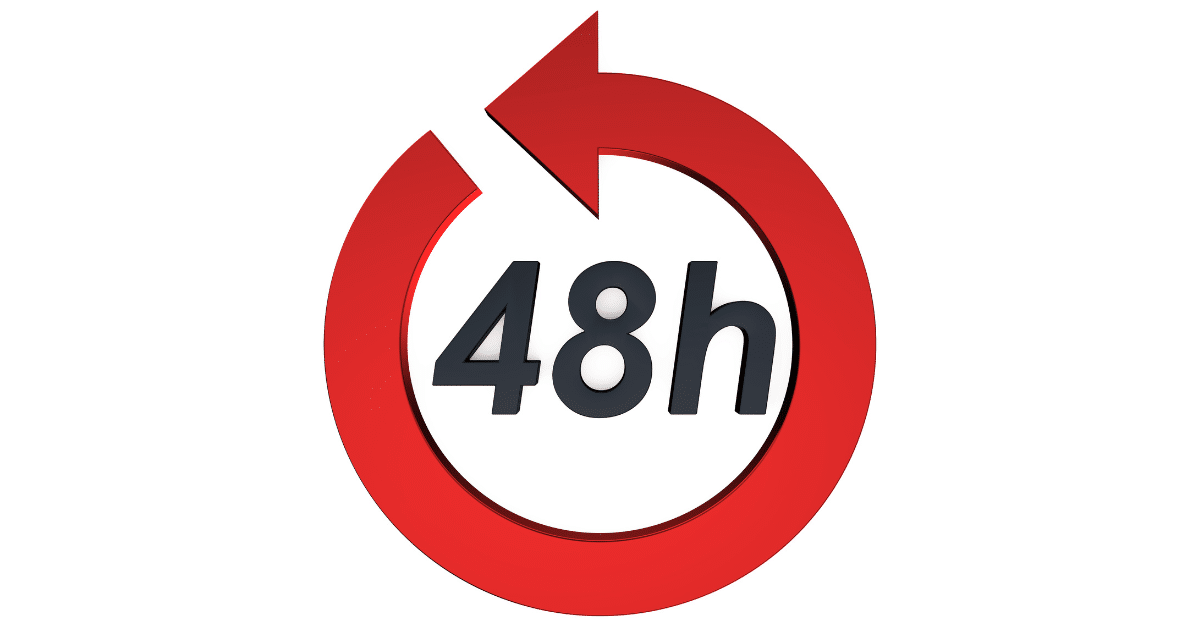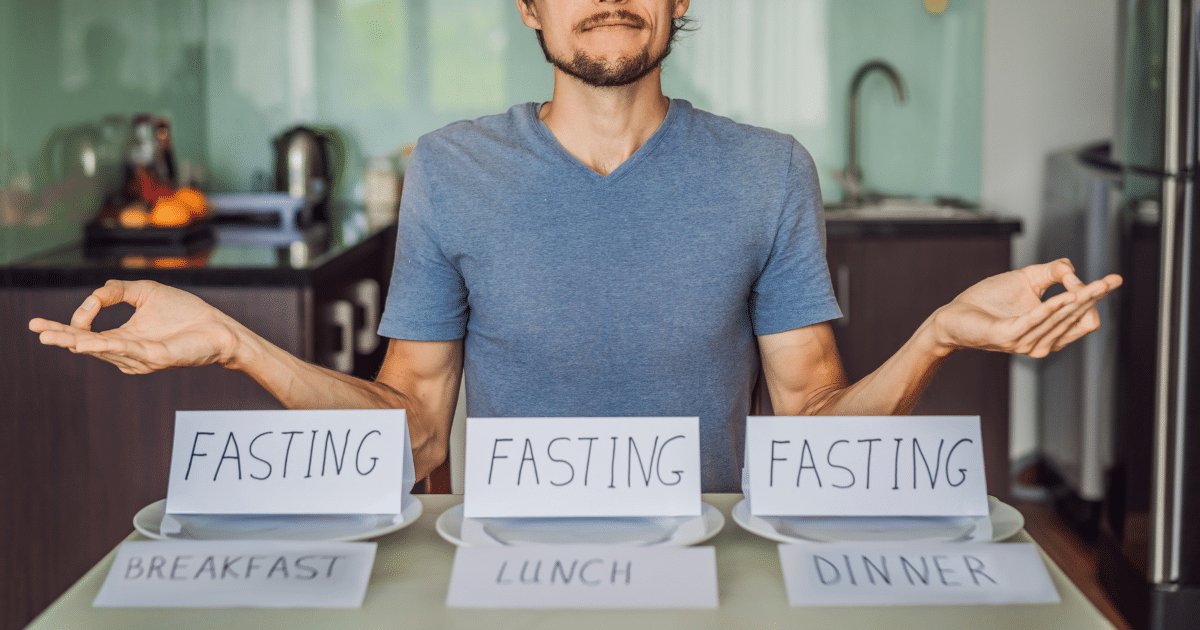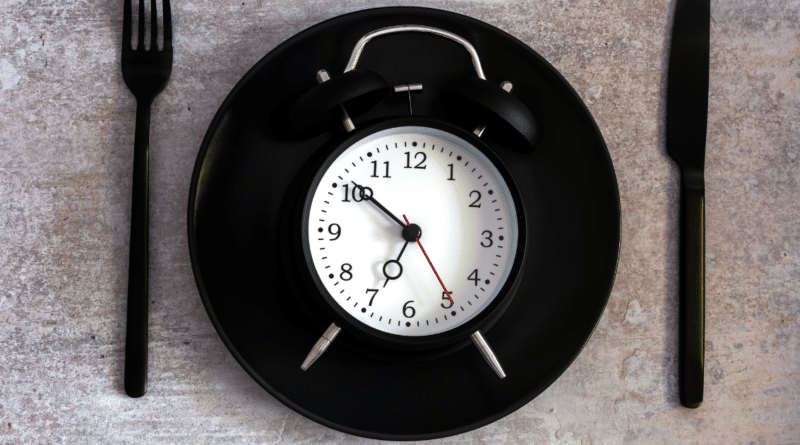Can 48-Hour Fasting Get You the Best Results Possible?
I know exactly what you’re thinking after reading the title of this article… Yeah, another fasting-based diet. You’re right. But hear me out. If you’ve tried intermittent fasting in the past, you’ve probably seen some results. This 48-hour fasting plan kicks things up a notch (or three).
Now, this style of fasting might not be for everyone, but it’s worth covering and offering you another option as it relates to the various types of fasting that people are using these days.
Related Article: What’s Better? Dry Fasting or Water Fasting?
48-hour fasting is a type of intermittent fasting where you stop eating for this duration while sticking to calorie-free drinks. It’s believed to have advantages for weight loss and cell renewal. Intermittent fasting has gained popularity over the years because of its possible health benefits. Among various fasting approaches, the 48-hour fast is one of the lengthiest, with shorter fasting periods being more common.
Choosing the right intermittent fasting method can be perplexing due to the array of options available. Each approach has merits and drawbacks, and understanding them can guide your choice while also being half the battle.

Overall, 48-hour fasting is an advanced intermittent fasting method, entailing a continuous two-day period without food intake. It’s important to note that this technique is suitable only for healthy individuals with previous experience in shorter fasting durations, like daily 16-hour fasts or occasional 24- to 36-hour fasts.
In this article, we will dive deeper and learn more about 48-hour fasting and its benefits to see if this is something you want to try for yourself.
Disclaimer: This article is for informational purposes only and is not meant to treat or diagnose any condition. It is recommended that you speak with your doctor before making any changes to your nutrition plan.
What is 48-Hour Fasting?
48-hour fasting falls under the intermittent fasting umbrella, involving a minimum 48-hour break from consuming any food. During this fasting period, you can only consume calorie-free beverages, aiding in electrolyte and energy replenishment.
Related Article: Water Fasting — A Health Hack or Dangerous Act?
To do the 48-hour fast, it’s essential to understand the rationale behind intermittent fasting. This dietary approach alternates between eating and fasting windows, allowing your digestive system periods of rest. During fasting, your body taps into stored fuel for energy, capitalizing on ketosis, where fat stores become the primary energy source as glucose depletes.

Fasting, a practice with a long history, has been employed for religious reasons by many individuals safely. Studies indicate that structured fasting and eating patterns contribute to weight loss and various health advantages.
48-hour fasting is rather stringent and isn’t suitable for everyone. Many individuals choose to undertake it once weekly, and it has gained significant popularity in recent years.
Will 48-Hour Fasting Put Me in Ketosis?
Yes, a 48-hour fast has the potential to put your body into a state of ketosis. Ketosis is a metabolic state in which the body shifts from using glucose as its primary energy source to using ketones, which are produced from the breakdown of fats. During a fast, especially one lasting 48 hours, the body depletes its glycogen stores, and when glucose is no longer readily available, it starts breaking down fat for energy, leading to the production of ketones.
Related Article: The 24 Hour Fast — Is It the Right Diet Choice for You?
However, the exact time it takes to enter ketosis can vary among individuals. Some people may enter ketosis sooner, while others may take longer. Factors such as individual metabolism, activity level, and prior dietary habits can influence the speed at which ketosis occurs.
Is 48-Hours Enough for Autophagy?

The process of autophagy, which involves the body’s cells breaking down and recycling damaged or dysfunctional components, is a complex biological phenomenon. While the exact duration for autophagy to occur can vary among individuals and depends on factors such as diet, exercise, and overall health, it is generally believed that autophagy may start after a certain period of fasting.
The 48-hour timeframe you mentioned falls within a range where some studies suggest that autophagy could be initiated. However, the onset of autophagy is not a precise science, and individual responses may vary. Longer periods of fasting, such as 72 hours or more, are often associated with more pronounced autophagic activity.
It’s important to note that fasting for extended periods should be approached with caution, and individuals with certain health conditions should consult with healthcare professionals before attempting prolonged fasting. Autophagy is just one aspect of fasting’s potential effects on the body, and the overall benefits and risks should be considered in the context of an individual’s health and wellness goals.
Is Fasting for 48 Hours Healthy?
Fasting for 48 hours can have both potential health benefits and risks.
While short-term fasting may offer metabolic benefits and contribute to weight loss by utilizing stored fat for energy, it’s important to be aware of potential dangers and side effects. Extended fasting may not be suitable for everyone, especially those with underlying health conditions such as diabetes, eating disorders, or metabolic issues. Dehydration and nutrient deficiencies are risks associated with fasting, so maintaining proper hydration and nutrient intake is crucial. Energy levels may vary during fasting, and engaging in strenuous physical activity may be challenging. Individuals may experience side effects like headaches, fatigue, or irritability.
The Benefits of 48-Hour Fasting
According to a study, “Extended fasting has the potential to address insulin resistance and cardiometabolic issues by promoting weight loss and enhancing various cardiometabolic indicators, all without the need for medications or surgical procedures.”
Below are a few reasons to consider before starting a 48-hour fasting:
1. It may reduce inflammation
Prolonged fasting wields robust anti-inflammatory properties, potentially decreasing the likelihood of inflammatory conditions like diabetes, heart disease, and cancer.

Fasting initiates hormonal shifts that reduce the creation of pro-inflammatory substances while also prompting immune cells to release anti-inflammatory molecules. This dual action helps quell immune responses and diminish inflammation.
2. Helps in weight loss
A 48-hour fast creates a significant calorie deficit that can support extended weight loss for certain individuals. Nevertheless, it’s crucial not to engage in 48-hour fasting too frequently.
According to a review, intermittent fasting delivers comparable short-term weight loss outcomes to conventional continuous calorie reduction, particularly in individuals dealing with excess weight or obesity. Consequently, reducing excessive calorie intake through traditional methods may be as effective as fasting for weight loss.
3. BDNF and brain function
Extended fasting positively impacts brain cells and promotes the growth of new nerve cells, a phenomenon referred to as neurogenesis. During fasting, the body increases the production of brain-derived neurotrophic factor (BDNF), a protein crucial for developing and preserving neurons.
Also, fasting exhibits the capability to diminish inflammation in the brain, reducing the risk of neurodegenerative disorders such as Alzheimer’s and Parkinson’s disease.
Click here to continue reading…


*Disclosure: This article may contain affiliate links or ads, which means we earn a small commission at no extra cost to you if you make a purchase through these links. These commissions help support the operation and maintenance of our website, allowing us to continue producing free valuable content. Your support is genuinely appreciated, whether you choose to use our links or not. Thank you for being a part of our community and enjoying our content.
PLEASE CONSIDER SHARING THIS ON YOUR SOCIAL MEDIA TO HELP OTHERS LEARN MORE ABOUT THIS TOPIC. SIMPLY CLICK BELOW!

